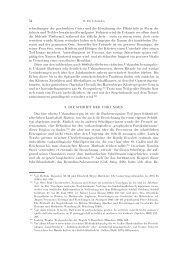Chapter Three ANTHOLOGIES AND ANTHOLOGISTS Between c ...
Chapter Three ANTHOLOGIES AND ANTHOLOGISTS Between c ...
Chapter Three ANTHOLOGIES AND ANTHOLOGISTS Between c ...
You also want an ePaper? Increase the reach of your titles
YUMPU automatically turns print PDFs into web optimized ePapers that Google loves.
98<br />
Part One: Texts and Contexts<br />
to take these charges of paganism seriously. But to be victimized in such a<br />
manner was most certainly a quite serious matter for those who were being<br />
accused of supporting pagan ideas. Cephalas’ petty fears are therefore quite<br />
understandable. In fact, seeing what had happened to one of the anthologists<br />
of the previous generation, Cephalas had good reason to be afraid.<br />
* *<br />
*<br />
Leo the Philosopher, Constantine the Sicilian & Theophanes the Grammarian<br />
The Apology of Constantine the Sicilian 43 provides an interesting parallel to<br />
the defiant words of Cephalas’ prooemium: “This is the worthy plea for a<br />
worthy cause, which I, the patricide of an impious teacher, piously put on<br />
record, even if the Hellenes may fret with anger and rage in words along with<br />
the Telchines” 44 . The Apology is a very curious text. In it, Constantine the<br />
Sicilian tries to defend himself against accusations of having shown a complete<br />
lack of piety towards his recently deceased teacher, Leo the Philosopher, when<br />
he publicly denounced him as a pagan. By good fortune we also possess the text<br />
of the very poem that Constantine’s contemporaries found so repulsive: the<br />
Psogos 45 . It is indeed a sort of spiritual patricide. Constantine heaps a load of<br />
bizarre allegations upon his former teacher. Leo did not believe in the triune<br />
Godhead of the Christians, but worshipped the ancient gods: lecherous Zeus<br />
married to Hera but always fooling around with his paramours, and all those<br />
other ridiculous divinities of whom Homer sings the praises. Now that Leo is<br />
dead and buried, Constantine wishes him a pleasant stay in hell where he may<br />
be punished together with those cursed Hellenes whom he so much admired:<br />
Socrates, Plato, Aristotle, Chrysippus, Epicurus, Proclus, Euclid, Ptolemy,<br />
Homer, Hesiod and Aratus. Constantine regrets dearly that he discovered the<br />
true nature of Leo’s teachings only when it was already too late; but now that<br />
he has seen the light, he cannot but tell the world what his former master was<br />
really like. That is why he repeats his allegations in the Apology, adding some<br />
new damning evidence and declaring his adamant faith in Christianity with the<br />
fervour of a newly converted. Reading the two poems, the Psogos and the<br />
43 The lemma attached to the poem should be emendated into: äpolog5a [Kznstant5noy<br />
kat2] L6ontoß Uilosöóoy, kaq\ Ùn Cristñn mên s6bei, t2 ^Ell8nzn dê óayl5fei, as MERCATI<br />
1923–25: 235, n. 1, demonstrated. For the identification of the author, see LAUXTERMANN<br />
1999a: 164–166.<br />
44 Ed. SPADARO 1971: 201, vv. 31–35.<br />
45 SPADARO 1971: 198–199.




